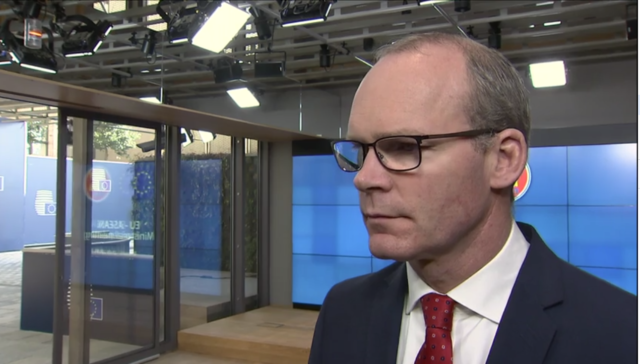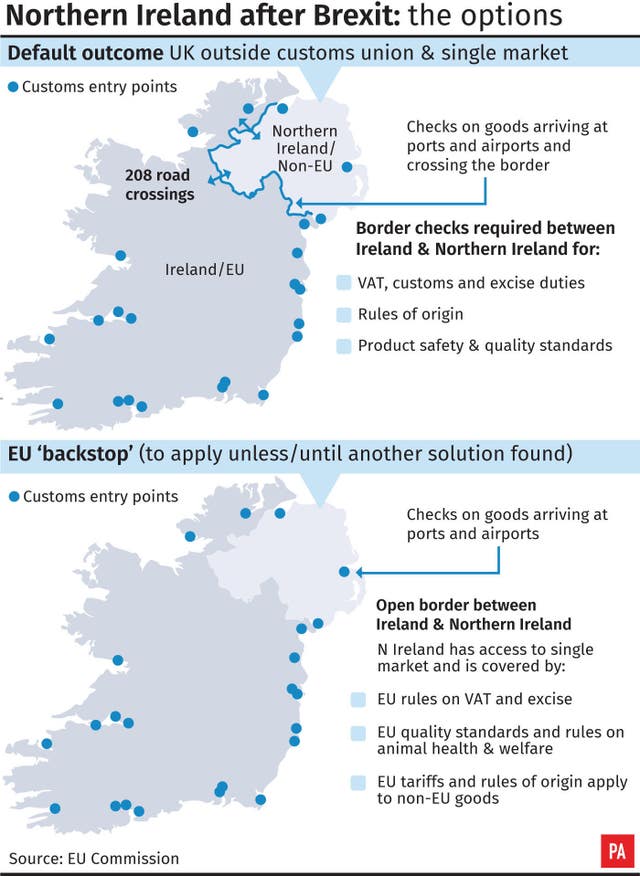
Poland has broken ranks with the rest of the European Union by suggesting that the Brexit deadlock could be ended by putting a five-year time limit on the controversial “backstop”.
The move came as Downing Street confirmed that Theresa May is focusing on possible improvements to the backstop – designed to keep the Irish border open after Brexit – as a means to winning parliamentary approval for her EU Withdrawal Agreement.
But Number 10 dismissed reports that the Prime Minister might seek a separate bilateral deal with Dublin, or even rewrite the Good Friday Agreement to neutralise the issue.
Irish foreign minister Simon Coveney met chief Brexit negotiator Michel Barnier in Brussels on Monday and said he received assurances that the EU remains “firmly supportive” of the Withdrawal Agreement in full, including its guarantees of no hard border in Ireland.
Mr Barnier himself said: “We are working 27 as a team, a single team and we negotiate as one.”

But Poland’s foreign minister Jacek Czaputowicz signalled a different approach from Warsaw, telling the Rzeczpospolita newspaper: “If Ireland asked the EU to amend the agreement with the British on the backstop so that it would apply temporarily – let’s say five years – the matter would be solved.
“It would obviously be less favourable for Ireland than an indefinite backstop, but much more advantageous than no-deal Brexit.”
Mr Czaputowicz said that London and Dublin were “playing chicken” over the border and risked a “head-on collision” in which Ireland stood to “lose the most”.
Following the crushing Commons defeat last week of her agreement with Brussels, the Prime Minister will make oral and written statements to the House explaining how she intends to proceed.
And her official spokesman made clear that she is focusing on the possibility of changes to the backstop mechanism, designed to ensure there is no hard border between Northern Ireland and the Republic if a broader trade deal cannot be agreed.
“It’s clear already that a significant number of colleagues have expressed concerns around the backstop,” said the spokesman. “That’s one of the areas that we are going to be looking at.”
Following the defeat of Mrs May’s Withdrawal Agreement by 230 votes last week, he said, “it is clear that if we are going to get Parliament to support the deal, we are going to have to come forward with something that is different”.
Sympathy, patience & readiness to wait until the UK’s position will be clarified are of utmost important to avoid the worst. They should not be misused for party politics. Large majority wants to exclude hard #Brexit – in the interest of the UK & beyond.
— Peter Altmaier (@peteraltmaier) January 21, 2019
Meanwhile, a senior member of Angela Merkel’s Government, industry minister Peter Altmaier, warned against trying the EU’s patience for political reasons.
“Sympathy, patience and readiness to wait until the UK’s position will be clarified are of utmost important to avoid the worst,” warned Mr Altmaier.
“They should not be misused for party politics. Large majority wants to exclude hard Brexit – in the interest of the UK and beyond.”
And the European Commission made clear that Brussels believes the ball is now in London’s court on Brexit. A spokesman told reporters: “Don’t look for answers from Brussels. Now is the moment for London to speak, not for us.”

Unusually, MPs will be able to amend the so-called “neutral motion” being tabled by the Prime Minister, with votes due to take place on January 29.
One group, including senior Labour MP Yvette Cooper and Tory former minister Nick Boles, is seeking to give time for a Bill to suspend the Article 50 withdrawal process if there is no new deal with Brussels by the end of February.
Another more radical amendment drawn up by former attorney general Dominic Grieve would allow a motion by a minority of 300 MPs – from at least five parties and including 10 Tories – to be debated as the first item of Commons business the next day.
Mr Grieve said it would enable the Commons to stage a series of “indicative votes” on the various alternatives, such as a “soft” Norway-style deal or a second referendum to establish which could command a majority.
Ms Cooper told BBC Radio 4’s Today programme that she believed the Prime Minister was hoping Parliament would rule out no-deal on her behalf.
She said: “I think she (Mrs May) knows that she should rule out no-deal in the national interest because it would be so damaging. She’s refusing to do so and I think she’s hoping that Parliament will do this for her – that is not leadership.”

Business minister Richard Harrington warned that crashing out of the EU without a deal would be an “absolute disaster”, telling Today he was “afraid” of car-makers Jaguar and Mini closing as a result.
“It’s not a road to a free trade agreement, it’s not a road to anything,” said Mr Harrington. It’s an absolute disaster for the country and it’s supported by a minority of a minority of people.”
Cross-party talks were continuing in Whitehall, with Mrs May’s effective deputy David Lidington speaking to MPs who support a second referendum.
Labour MPs Chuka Umunna, Chris Leslie, Gavin Shuker and Luciana Berger defied Jeremy Corbyn’s plea for the party’s MPs to boycott the talks.


Comments: Our rules
We want our comments to be a lively and valuable part of our community - a place where readers can debate and engage with the most important local issues. The ability to comment on our stories is a privilege, not a right, however, and that privilege may be withdrawn if it is abused or misused.
Please report any comments that break our rules.
Read the rules here